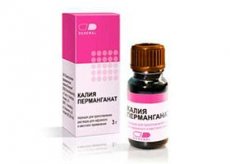Medical expert of the article
New publications
Preparations
Potassium permanganate
Last reviewed: 03.07.2025

All iLive content is medically reviewed or fact checked to ensure as much factual accuracy as possible.
We have strict sourcing guidelines and only link to reputable media sites, academic research institutions and, whenever possible, medically peer reviewed studies. Note that the numbers in parentheses ([1], [2], etc.) are clickable links to these studies.
If you feel that any of our content is inaccurate, out-of-date, or otherwise questionable, please select it and press Ctrl + Enter.

Potassium permanganate is a disinfectant. It is a powder for making a solution for external use.
 [ 1 ]
[ 1 ]
Indications Potassium permanganate
Among the main indications: disinfection of burns with ulcers, as well as infected wounds. In case of infectious inflammation of the oropharynx and oral mucosa (for example, tonsillitis) - used for rinsing. In case of urogynecological diseases (urethritis, and in addition colpitis) used for douching or washing the area.
It can also be used for gastric lavage: in case of poisoning with orally taken alkaloids (such as nicotine with morphine or aconitine), quinine and phosphorus, as well as hydrocyanic acid. It can be used to wash the skin after contact with phenylamine; and the eyes in case of intoxication with insect venom.
Pharmacodynamics
After interaction with various organic compounds, the active substance produces atomic oxygen. As a result of the reduction of potassium permanganate, MnO2 is formed, which, together with proteins, creates albuminates. As a result, the preparation in small concentrations acquires astringent properties, and when forming an aqueous highly concentrated solution, it acquires cauterizing, and at the same time tanning, as well as irritating properties. In addition, it has a deodorizing effect.
Since potassium permanganate is capable of neutralizing certain poisons, its solution is often used for gastric lavage in cases of intoxication.
Dosing and administration
The medicine should be used externally as a disinfectant solution for wounds (concentration 0.1-0.5%), and in addition to this as a means for gargling the throat and mouth (concentration 0.01-0.1%), treating burns with ulcers (concentration 2-5%), douching for urogynecological diseases (concentration 0.02-0.1%), and in addition to this for gastric lavage in case of intoxication.
To dissolve this powder, you need to put a few crystals in warm water (a glass), and then stir until completely dissolved. This solution can only be used freshly prepared.
Overdose
Overdose symptoms include: sharp, severe pain in the mouth, throughout the digestive tract and abdomen, as well as diarrhea and vomiting. The mucous membrane in the mouth and throat swells and becomes purple or dark brown. Laryngeal edema may occur, mechanical asphyxia may begin, and psychomotor agitation or shock from a burn, parkinsonism or dysentery may develop. In addition, seizures and nephropathy may occur. If gastric secretion has reduced acidity, there is a possibility of increased methemoglobin levels in the blood with noticeable dyspnea and cyanosis. For a child, the lethal dose is approximately 3 g, and for an adult - 0.3-0.5 grams / kg.
For treatment, a solution of methylene blue is used (50 ml of a 1% solution is required), vitamin C (IV 5% solution with a dosage of 30 ml), vitamin B12 (maximum 1 mg), and vitamin B6 (IM 5% solution with a dosage of 3 ml).
Interactions with other drugs
Potassium permanganate cannot be combined with individual organic compounds (such as sugar with coal, and also tannin) and substances that oxidize quickly. As a result of such a combination, an explosion may occur.
 [ 29 ]
[ 29 ]
Storage conditions
The powder should be kept in a dry place, out of reach of children. Temperature conditions should be within 15-18°C.
 [ 30 ]
[ 30 ]
Attention!
To simplify the perception of information, this instruction for use of the drug "Potassium permanganate" translated and presented in a special form on the basis of the official instructions for medical use of the drug. Before use read the annotation that came directly to medicines.
Description provided for informational purposes and is not a guide to self-healing. The need for this drug, the purpose of the treatment regimen, methods and dose of the drug is determined solely by the attending physician. Self-medication is dangerous for your health.

